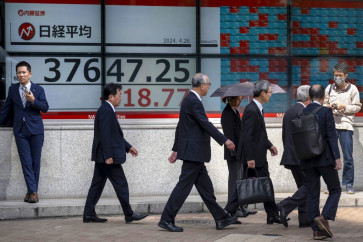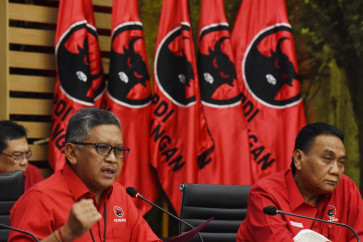Coal upgrading will only boost exports
The government’s plan to ban low-calorific coal exports starting in 2014 will not help the country reduce reserve exploitation if the technology to upgrade coal calorific value is available, according to an industry group
Change Size

T
he government’s plan to ban low-calorific coal exports starting in 2014 will not help the country reduce reserve exploitation if the technology to upgrade coal calorific value is available, according to an industry group.
Bob Kamandanu, chairman of the Indonesian Coal Mining Association (APBI), told reporters on Tuesday that Indonesian coal producers would find it very difficult to resist the temptation of good prices in the international market.
“If we have a proven technology to upgrade the calorific value of coal, exploitation and exports will certainly soar. There will be no conservation,” he said on the sidelines of a discussion on adding value in the mining sector.
Since coal miners were government contractors, the best way to prevent coal over-exploitation was by limiting the production increases of each company, he said.
“Every year, [coal producers] submit our spending and production budgets to the government. Through that, the government can reject budgets with increases that are too high,” Bob, also a commissioner for PT Berau Coal, said.
“The government should also boost domestic market absorption by accelerating the completion of coal-fired power plant projects. The government must also eliminate all constraints on independent power producers to build new power plants.”
Domestic users can currently absorb only 24 percent of the country’s total coal production.
The 2009 Mineral and Coal Law will ban raw material exports in 2014, requiring all miners to process raw materials in country to develop the downstream mining industry.
The Energy and Mineral Resources Ministry is currently preparing a ministerial decree on mineral and coal processing. According to the draft decree, which is currently under discussion with mining companies, coal miners can only export coal with a calorific value of at least 5,700 kilocalories per kilogram.
The ministry’s director general for minerals and coal, Thamrin Sihite, said that added value in the coal mining sector was not only about producing coal with a higher calorific value, but was also about increasing state revenue, job opportunities and investment.
“Input from businesspeople is very important. But what we need to keep in mind is that we need investors and increased state revenue,” he said.
An energy expert from the ReforMiner Institute, Pri Agung Rakhmanto, urged the government to establish a clear policy on the future of the country’s coal industry.
The government had to choose between boosting production or prioritizing stainability, he said.
“The growth of national coal production is very high, around 20 percent a year. It’s not ideal. Other countries with larger coal reserves, such as China, India and Russia, have even lower growth of around 5 percent per year,” he said.
As of the third quarter of this year, APBI reported that Indonesia produced around 270 million tons of coal, or about 30 million tons per month, putting the nation on target to reach a production target of 340 million tons of coal by year end.
Bob said a drop in coal prices was possible since the effect of economic crisis in Europe and the US would be significant. However, he predicted the price would not be lower than US$100 per ton.









